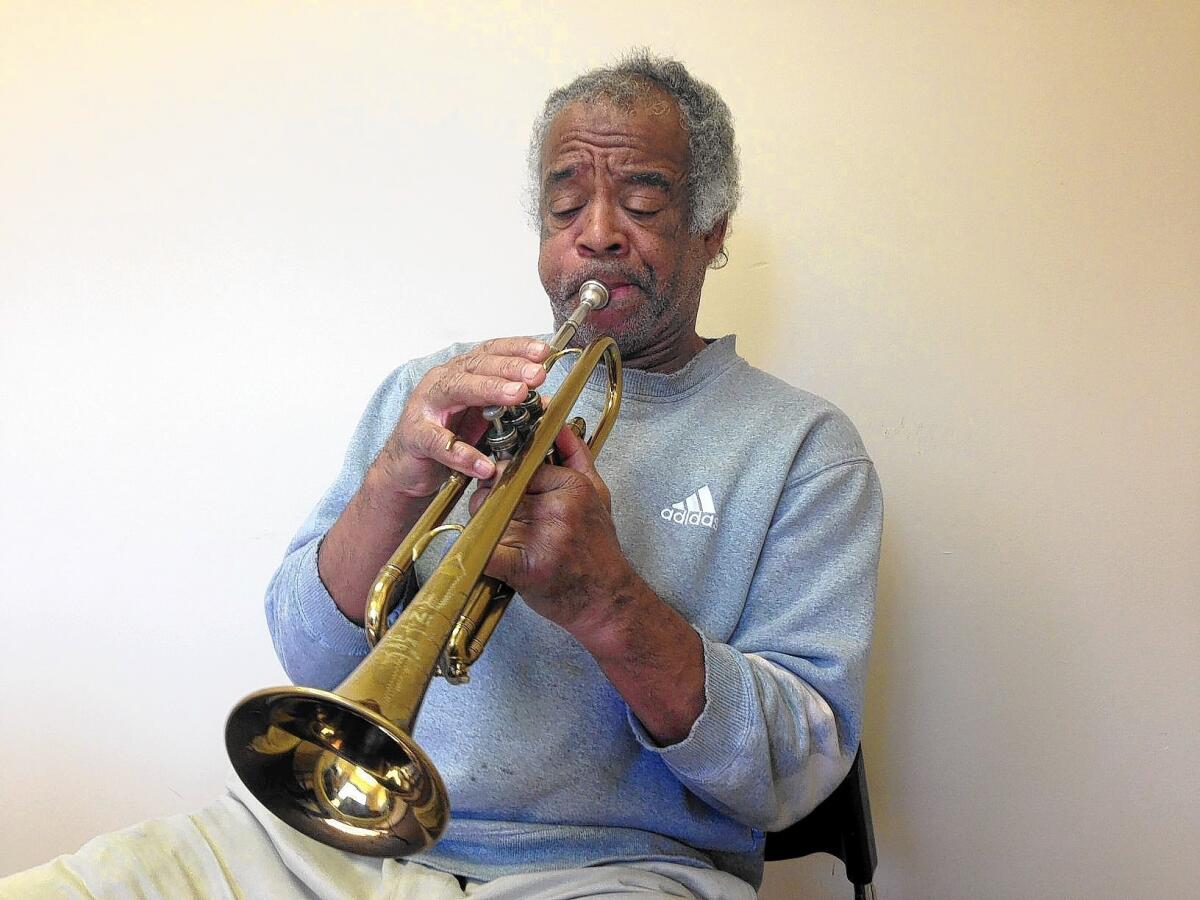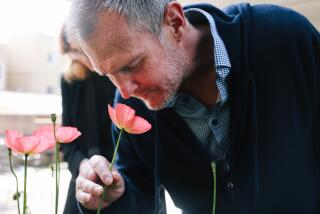Checking in with Nathaniel Ayers

Once a week or so, an escort leads me through locked doors to a dorm-like setting that is a temporary home to a few dozen men and women.
Severe mental illness has landed them at this Long Beach rehab center, and you can see the toll it has taken. It’s as if the patients are trying to escape a bad dream, make sense of what happened and convince themselves that there will be better days ahead.
Generally it’s a pretty quiet place, except for one room near the nursing station. There, my friend Nathaniel Ayers can often be found playing one of his many instruments.
Recently, he called to tell me that his trumpet was falling apart. On my way to Long Beach the next day, he phoned me for an ETA and to ask if I’d been able to find him a new horn. Yes, I said, and a few minutes later, as I walked to the lobby of the rehab center, I heard a banging and turned to see Ayers waving at me through a window. The man’s been through a lot, but he’s still got a great smile.
We have known each other almost 10 years now. It’s a friendship that isn’t always easy but is never dull. I’m still learning how his mind works, and how “the system” can better help him and others.
Even when Mr. Ayers had a place to live, with supervision, it wasn’t easy for mental health professionals to treat him. He would turn against his closest allies and supporters at times, and not only refuse help, but insist that he didn’t need any. He adamantly resisted taking medication. Last year, trapped in a dark web of delusional ideas, he became combative, and was committed after he threatened a neighbor.
When I wrote about him six months ago, he was in court for a conservatorship hearing, fighting a doctor’s recommendation that he take anti-psychotic medication. He argued that drugs had caused horrible side effects for him years earlier. Part of me wanted him to prevail; part of me wanted to see if meds might bring him relief, clarity and peace.
Mr. Ayers lost his argument in court and reluctantly began taking meds. I began to notice changes a few weeks into it. He was softer around the edges, more focused and more lucid. Aside from occasional drowsiness, there was no sign of the zombie side effects he had feared.
Several weeks ago, I took a mutual buddy to see him, and Mr. Ayers was thrilled to see Adam Crane, who was PR director for the Los Angeles Philharmonic before moving on to the same job in St. Louis. Crane has been an advocate for the mentally ill since meeting Mr. Ayers, who had prepared a concert for us.
He laid out his violin, his cello and the upright bass. It was the bass that got him to the Juilliard School for the Performing Arts 43 years ago, where he played with Yo-Yo Ma. Back then, he hoped to end up in a great orchestra one day. That dream died with his schizophrenia diagnosis.
During his concert for Crane and me, Mr. Ayers jumped from one instrument to another.
“I’ve never heard him play so well,” said Crane, and Mr. Ayers beamed.
It’s true. His music, like his speech, is more grounded and coherent lately. Not all the distortion has been cleared, but he’s improved enough to be allowed day passes and he recently attended a Sunday church service with friends of his sister, where he played violin for hundreds of worshipers.
“With all due modesty,” he told me, “I brought the house down.”
He also played violin on a visit to Housing Works, the Hollywood nonprofit that found a home for him last year.
“He engages in conversations, he laughs, he’s got a sparkle in his eye,” said Housing Works’ Mollie Lowery, who has saved countless people from Los Angeles’ streets and came to Mr. Ayers’ rescue when he lost his downtown apartment. “He’s looking outside, touching other people and responding to them rather than being locked inside his own illness.”
The meds have helped, Lowery believes, and so has structure, talk therapy and constant monitoring by medical staff.
But the kind of care he’s getting now is in extremely short supply, and I suspect the well-known story of our friendship has had an influence on that, though I’ve never asked for special treatment for him. To Lowery, Mr. Ayers is an example of what could and should happen for every person who suffers serious mental illness, if only there were enough resources and the flexibility to meet each individual’s needs over the long haul.
And yet, Lowery and I are holding our breath. Mr. Ayers still insists he doesn’t need the rehab center, the therapy or the drugs. Depending on the day you ask him, he isn’t convinced that he’s any better at all, or even that he needed to get better.
One day, we suspect, he will have made enough progress to be released. When that day comes, it’s possible he will prosper, and it’s possible he will slide again.
“There are no quick fixes in any of this. He’s got a lifetime illness,” Lowery said. It’s critical to his recovery, she said, that he knows Housing Works will stick with him regardless of what happens, and that others who care about him will do the same.
“I’ve got my problems, but I wanna be free,” Mr. Ayers told me after finding a nice groove on his new trumpet. “I wanna be back out there, using every moment as if it’s the most precious thing in the world. I don’t have any time to waste.”
More to Read
Start your day right
Sign up for Essential California for news, features and recommendations from the L.A. Times and beyond in your inbox six days a week.
You may occasionally receive promotional content from the Los Angeles Times.







